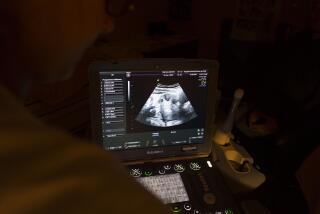Science / Medicine : Blood Analysis Promises to Reduce Risk of Fetal Testing
- Share via
WASHINGTON — New blood sampling methods may offer a safer, easier way of determining an unborn baby’s sex, but more work is needed before the tests will be available in doctors’ offices, researchers said last week.
Current prenatal tests used to check for sex and genetic defects, like Down’s syndrome, require withdrawing fluid or tissues from a pregnant woman in areas near her developing fetus. Such procedures pose a risk of infection and other complications due to their invasive nature.
Since the 1970s, researchers have been trying to develop safer screening tests using the fetal red blood cells that naturally leak from the placenta into the mother’s bloodstream.
Early results were disappointing, but recent development of a sophisticated technique to amplify genetic material appears to have made a significant difference.
Boston researchers presented encouraging findings using the technique, called polymerase chain reaction, last month at the American Society of Human Genetics’ annual meeting.
In tests of 19 expectant mothers, researchers detected signs of the Y chromosome in the blood of six of the eight women who gave birth to a boy. The Y chromosome is present only in men, and would not be found in the bloodstream of a woman who is not pregnant or who is carrying a female fetus.
Now, British researchers are reporting similar progress.
In a study published this month in the journal Lancet, Drs. James Wainscoat and Kenneth Flemming of John Radcliffe Hospital in Oxford, England, tested blood from 19 pregnant women for the presence of the Y chromosome. Researchers found male genetic material in the blood of all 12 women who gave birth to boys, while none was found in the seven who had girls.
Apart from satisfying parents’ curiosity about whether to buy blue or pink booties, such tests also might be used to help counsel pregnant women who carry genes for diseases that afflict primarily males, such as muscular dystrophy, researchers said.
Dr. Diana Bianchi, an assistant pediatrics professor at Harvard Medical School and head of the Boston study, said Thursday that widespread use of non-invasive prenatal tests “is not just around the corner.”
One problem turned up by the British study was that, if the process was not closely regulated, all samples eventually tested positive for male genetic material due to unknown “background contamination.”
Bianchi warned that such tests could lead to many false positives in the hands of untrained laboratory staff.
Due to risk, current methods of prenatal screening--amniocentesis and chorionic villus sampling--are generally offered only to women over age 35 or those at high risk for carrying a genetic disease, Bianchi said.






